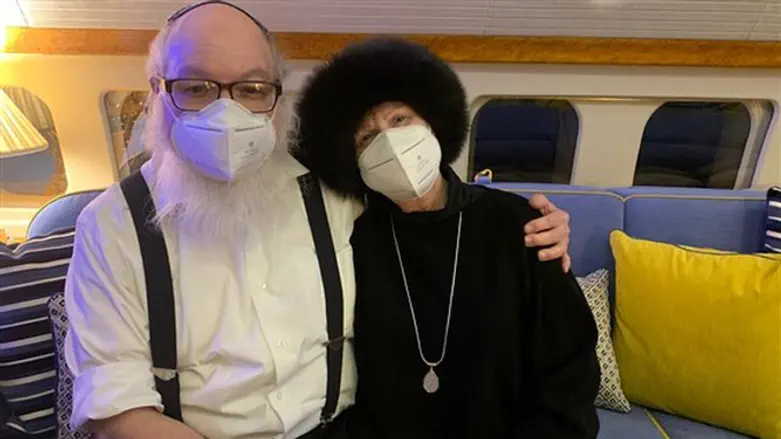
Thirty-five years after he served as an Israeli spy, Jonathan Pollard opened up about his espionage work, sharing details for the first time about his work on behalf of Israel while working as a naval analyst in the 1980s.
In an interview published by Israel Hayom Monday morning, Pollard discussed his decision to pass on sensitive information to Israel, his conversations with Rafi Eitan – a top Israeli intelligence official in the 1980s – as well as his removal from the Israeli embassy in 1985 after he was discovered by the FBI, and his subsequent three decades in an American prison, followed by his new life in Israel after his release.
“The people in our neighborhood are wonderful,” said Pollard. “When we need, I go to the local corner store, and sometimes we go together to the supermarket. It is kind of hard for me to walk because of my back and leg pains. It is hard for me to describe to you how amazing it is to be able to walk on the street with Esther. Everything is so amazing. The sky is so blue and beautiful. People talk with us, and from the conversations I feel that they really know that someone was ready to sacrifice his life for them.”
“But one thing I don’t understand is why people are always asking for ‘selfies’,” Pollard said with a laugh. “What is this nonsense? When I went to prison, there were no cell phones or selfies. Both Esther and I are very private people, and our privacy is very important to us.”
The Pollards lamented the fact that because of Jonathan’s lengthy prison sentence, he and his wife were unable to have children.
“That is one of our great tragedies,” said Esther. “It is one of the things that made the pain that much worse.”
“In Israel, people are used to having a basic human right to have children. In America it is exactly the opposite. From the moment that you’re convicted, you have no rights – certainly not the right to have children.”
“We begged the government to give us the chance to bring children into the world any way possible. But in the US there is no way for the wife to join with her [imprisoned] husband.”
Jonathan joined in, saying: “If anyone tells you that men don’t have the need to have children the same as women, he’s lying. Because children are everything.”
Turning to his time as an Israeli spy, Jonathan Pollard said that it was he and his first wife, Anne, who saved his handler, Aviem Sella, from being captured by the FBI in the spring of 1985.
“The FBI arrested me outside of the office. I asked to be allowed to call my wife, Anne, since Aviem and his wife were waiting for us at a restaurant in the city for dinner.”
“My main concern was getting him out of the country, because he didn’t have diplomatic immunity. I saw myself as being expendable. He was a national hero, a national asset for Israel. I was a soldier, that’s it.”
After he was discovered by the FBI, Pollard sought asylum in the Israeli embassy, but was ultimately forced to leave the premises.
“The guard told me: ‘I’m sorry, but they’re saying in Jerusalem that you need to go out and come back in from the main gate.’ I told him: ‘I won’t make to the main gate. There are 20 FBI agents waiting outside. Do you know what they’ll do to me? He said back: ‘I’m sorry, but you have to leave.’”
Pollard blamed Rafi Eitan and his Israeli handlers for his capture, saying they failed to prepare him for work as a spy.
“I wasn’t trained as an agent. There was no escape plan. When I expressed concerns, Rafi Eitan made light of them.”
Pollard also denied that he was motivated by financial concerns, saying that he worked as a spy solely out of a desire to help the Jewish state.
“There was an intel embargo on Israel. The Americans had stabbed Israel in the back and were not handing over information which they were obliged by treaty to give. And it wasn’t just withholding information; it was also lying to the Israelis.”
“I was present at meetings when these things happened. I know that I crossed the line, but I had no choice. The threats against Israel were very serious. When an Arab states is developing chemical weapons of mass destruction and the US hides it from Israel, every Jew needs to ask himself what do the words ‘Never Again’ mean.”
